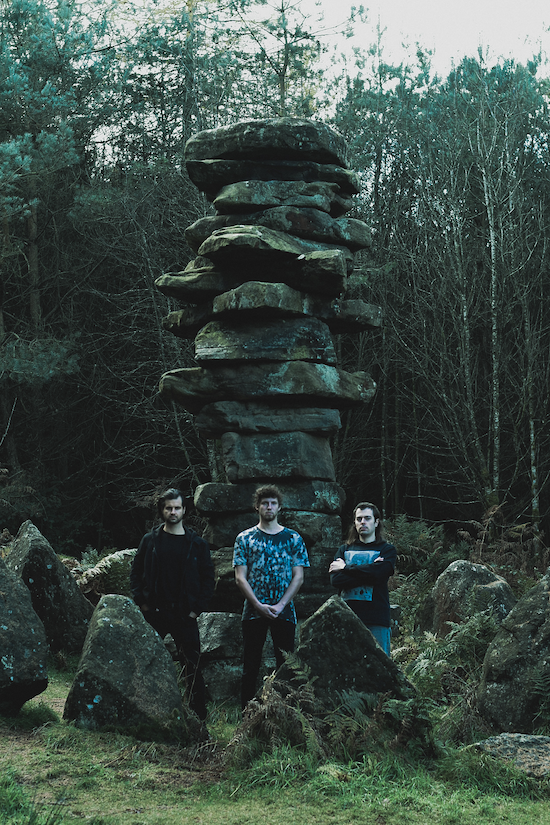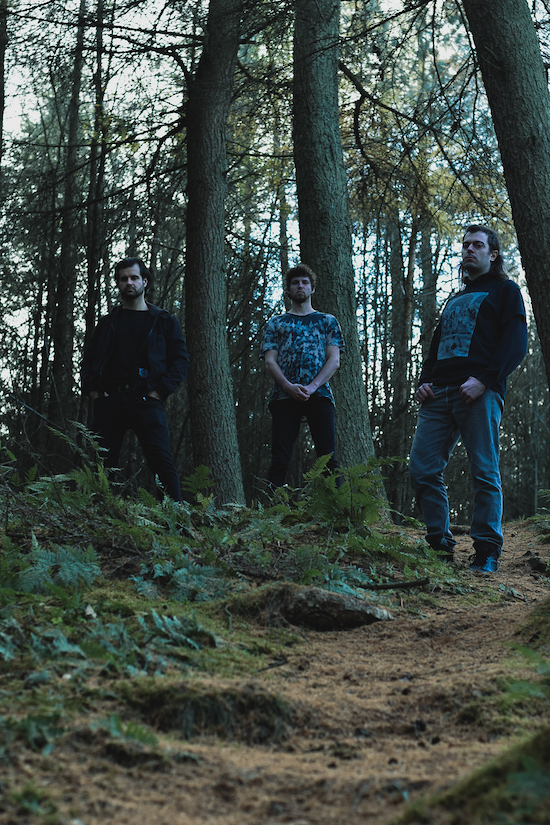All photos by Celestial Light
Kurokuma is named for a waterfall, located near the town of Ajigasawa in northern Japan and translates as ‘Black Bear’ – the waterfall resembles the animal if it were standing on its hind legs. Musician Joe Allen first visited when he was living nearby, working in Japan as a translator. He loved his time in the country. “Life was great, it was the most fun I’ve ever had as a human being,” he tells tQ over Zoom, now back in his native Sheffield, “but there was always this thing in the back of my mind: ‘I wanna be in a band, I wanna make some heavy music that makes a difference.’” During a subsequent spell in Japan, when he was working as an English teacher, a culture of heavy after-work drinking among ex-pats began to take its toll. “It was great, but it became this blur, and towards the end I felt like my life was not progressing in any way. Probably regressing, actually.”
Looking for an out, he managed to find a job in Santiago, Chile teaching English at a university, and booked a short holiday in California enroute. He stayed in Hollywood and saw the sights, and then, three days before he was due to move on to Chile, he accidentally ran his passport through a washing machine. Informed there was no chance that Chilean border officials would accept soggy paper and a blurred picture, he was forced to spend all the money he had saved to get settled in South America on an emergency replacement and a motel. “I was just like, ‘fuck it. I’m going home,’” he recalls.
Allen never left for Chile. Instead, he returned to Sheffield where he linked up with an old friend called Jake Mazlum. When Allen was in sixth form, his teenage metal band were playing at central venue Corporation and Mazlum was in the crowd wearing a Dillinger Escape Plan t-shirt. They got speaking after the show; Allen in fact declined the opportunity to play in a new project Mazlum was plotting then because he was leaving for Japan that summer, but they stayed in touch over Myspace. Upon Allen’s return from Los Angeles, he acted on that deep-seated desire to form a band that he’d been feeling back in Japan, and they started hanging out together again in person.
They formed a band and chose the name Kurokuma mainly because of the word’s rhythm. Because Mazlum doesn’t speak Japanese, “to him it didn’t have a meaning, but he liked the sound of it and so did I. There’s something about the two Ks that’s kind of mysterious,” says Allen. It was important too, he continues, for their name to hint at a wide, international scope, in keeping with a philosophy they laid out from the start: they wanted to play sludge and doom metal, Allen explains, but also to be ambitious and wide in their scope – “doom plus something else,” as Allen puts it. “That something else has always been the influence of what you might call world music, just stuff that isn’t necessarily native to England. We both love travelling, we both love experiencing other cultures, and we love metal and doom.” Seeking ways to innovate with their music, it seemed natural to combine those two passions. “It wasn’t contrived or forced,” he says.
As we speak, Allen’s wearing one of the band’s most popular merch items, a baseball cap emblazoned with the motto ‘Make Sludge Grim Again’. “We’re not even the grimmest sludge band,” he admits, “but there was this time where sludge and stoner were being chucked around a lot as terms for things that weren’t really what sludge is – absolutely filthy, dirty music. It’s important for us to push the boat out a bit.” One of the ways the band have achieved this, particularly in their early days, was to embrace their love of electronic music, raves and free parties. “Although we perhaps don’t bring in the sounds of rave stuff, we want to bring in the feel of overwhelming volume and overwhelming rhythm,” Allen explains. Rave and doom metal “are both extreme forms of music to me.” Bassist George Ionita, who turned up to audition for the band with a battery-powered bass that ran out of power halfway through, and who runs a soundsystem in Liverpool, is particularly passionate. “You get in his van and it’s just gabba.”
Pointedly, they were the first metal band to release music on Sheffield rave label Off Me Nut, 2019’s appropriately-titled Sheffield’s Best Metal Bands, Vol.1 which was the product of an astoundingly coincidental night in Tokyo, where Kurokuma were support for Liverpool band Conan’s Japanese tour, and Off Me Nut founder Michael ‘Tich’ Townsend was putting on a rave in the city on the very same night. “He came and watched us play and then we went to his rave after. There were Japanese kids with Sheffield United shirts on, it was crazy.” In the aftermath, they discussed combining the two worlds once more via an EP.

Sheffield’s Best Metal Bands Vol.1 reveals something at the core of Kurokuma – a desire to reach colossal levels of intensity. At a Kurokuma show, “it’s very important that we get people moving, not just headbanging or moshing like at a normal show, but it’s quite important that we get people to go beyond. Sometimes when it’s the right crowd and the energy’s there, people just dance and let themselves go. That’s the energy we try and create. It’s not ‘let’s have a few beers and have a great time with the lads, we want to reach within a person and get them moving like they can’t resist. We want to touch that primal instinct.”
The band have had their principles straight “from the start,” Allen says. “Everything is planned, everything is a concept.” It’s thanks to this attitude that in the years since they formed in 2013, regularly releasing singles and EPs as they go, they’ve been holding lots of their best material back so that their eventual debut album – this February’s Born Of Obsidian – could be as coherent as possible. “We don’t just want to put out music for music’s sake.” There were subtle hints of a musical influence from Central and South America here and there in their past EPs and singles, but on their album the band drew wholeheartedly from those inspirations. They could only release an album when the time was right, he continues. “We needed to wait until everything was lined up perfectly, the music, the lyrics and the art. There’s no way we could have written this album towards the start, it took years to get to that point.”
Born Of Obsidian is a concept album, reflecting the band’s fascination with extinct Mesoamerican cultures, in particular the Olmecs – the earliest known civilization in the region – and the Aztecs – who were wiped out by European colonial conquests in the early 16th century. The album’s title refers to the way Aztec priests are believed to have used obsidian mirrors to receive messages from the god of providence Tezcatlipoca who was associated with the material. His name translates into English as ‘Smoking Mirror’, from which the album’s opening track also takes its title. ‘Sacrifice To Huitzilopochtli’, Allen says, “is straight up about human sacrifice. The Aztecs believed that if they didn’t sacrifice to the sun god, the sun would stop in the sky. The track ‘Jaguar’ concerns the way ancient Olmec shamans could supposedly transform into the beasts, and ‘Ololiuqui’ is about the hallucinogenic seeds that, when taken, would supposedly allow communication with the gods. Closing track ‘Under The Fifth Sun’ recounts the collapse of Aztec society due to the plague and warmongering of Spanish conquistadors, and takes its title from the Aztec doctrine in which the present world had preceded by four other cycles of creation and destruction.
It is the spiritual dimension of Aztec and Olmec societies that most fascinates Kurokuma, and which first gripped Allen’s imagination as a child. “When I was in school there was an encyclopaedia and I always loved turning to the page on the Aztecs. There was a picture of a big temple, and human sacrifices. It fascinated me, it seemed so otherworldly, barbaric and gruesome. As a kid I’m sure you can imagine how it just grabs your imagination.” It is the depth of belief, the fact that people died for it, that fascinates him, and on Born Of Obsidian he hopes that the levels of intensity the band provide to their listener can induce something similar. “I want to put them in the intense frames of mind. ‘Sacrifice To Huitzilopochtli’ is a brute force song, its simple, it hits hard. ‘Ololiuqui’,” the song about hallucinogenic communication with the gods, “is trippy. We really consciously make sure that the music goes with the lyrics.”

It is not known what Olmec and Aztec music itself would have sounded like, but the band have embraced other musical traditions from the region, particularly in the record’s rhythmic aspects. “We try to make things as authentic as we possible and do things with respect, changing any musical bits that we didn’t feel matched up.” Their close friends in Mexican metal band Vinnum Sabbathi with whom they toured in 2017 served as unofficial consultants. “We would run stuff by them to make sure we weren’t just slaughtering their culture. It was on our minds that we didn’t want to be seen as people who were culturally appropriating.” Nevertheless, when they first shared the album’s cover – which features iconography including one of the Olmecs’ so-called ‘colossal head’ sculptures – “we did get a couple of comments from Mexican nationalists saying ‘this isn’t your culture.’”
In response, Allen says, “it was literally two people on Instagram. We’ve had plenty of Mexican people who really enjoy listening to it and say it’s amazing.” He cites the depth of the band’s interest and research, and ultimately the coherence of Born Of Obsidian’s concept, as a counter to claims of appropriation. “We’re not just taking an image and thinking ‘that looks cool, we’ll put it on the album.’ The whole album is about this theme that’s a passion of ours, something we’ve studied and we’re genuinely inspired by. The album would not sound the way it does if we hadn’t used this concept, and I hope that is genuine. Perhaps I’m being naïve…”
It is hard to deny the intensity of effort that Kurokuma have poured into their debut album, and the intensity of sound that that has generated. Recorded with renowned metal producer Sanford Parker, who flew over to London to work on it after the pandemic prevented their initial plans to make the album in Steve Albini’s Electrical Audio studios in Chicago, they then agonised over post-production so much that they ended up not using Parker’s mixes entirely and enlisting trusted friend Chris Butterworth so they could tweak every last detail “Obviously it cost us a lot of money, but it is what it is,” Allen says. “We’re a very particular band trying to do a particular thing.”
Naturally for a band who place such pride on their attention to detail, Kurokuma have their next step figured out in advance. Allen won’t give much away on the details, other than that they’re departing from Mesoamerican themes. “The next album is about something else, something more universal, you could say,” is all he’ll offer. Whatever form Kurokuma’s next step will take, however, intensity is a given.
Kurokuma perform as part of the last ever Raw Power Festival, which takes place August 24-26. Find the full line-up and tickets here.


